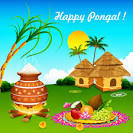Pongal
Pongal is the festival to celebrate Uttarayana, the northward journey of the Sun from the south. It is celebrated on the first day of the month of Thai, the tenth month in the Tamil calendar.
The festival is known with different names in different states:
 Makara Sankranthi in Bengal, Andhra Pradesh, Goa, Kerala, Bihar, Odisha, Karnataka, Madhya Pradesh, Manipur, Maharashtra and Uttar Pradesh.
Makara Sankranthi in Bengal, Andhra Pradesh, Goa, Kerala, Bihar, Odisha, Karnataka, Madhya Pradesh, Manipur, Maharashtra and Uttar Pradesh.
Uttarayana in Gujarat and Rajasthan.
Bhogali Bihu or Magh Bihu in Assam.
Makar Sankranti or Maghe Sankranti in Nepal.
On this day the Tamils thank the Sun god (Surya) for the fine yield or crops and offer the first grains to him on this ‘Surya Mangalyam’.
Homes are decorated with mango and banana leaves and the floor is embellished with beautiful patterns using red clay and rice flour.
The Pongal dish is prepared using rice and milk. Also, the dish is made sweet with ingredients like jaggery, cardamom, raisins, cashew nuts and mung dhal. Banana leaves are used to serve the dish.
During the making of the dish, the custom is to scream Pongalo Pongal! as the milk ripples out of the container. Further, freshly harvested rice grains are introduced in the pot and the sanggu (a conch) is blown. The boiling over of the milk is considered to be a sign of good omen by Tamils.
The day is marked with exchange of gifts, greetings and sweets such as murukku, vadai, paayasam, etc.
Rangolis or kolams are drawn on doorsteps to welcome guests. Also, it is made to welcome growth and prosperity to the house.
Bhogi is celebrated a day before Pongal. On this day, old things are discarded by people to mark a new start.
Maatu Pongal is celebrated a day after Pongal. On this day, cattle are felicitated by Tamils. Cattle hold a significant value for Tamils as they consider them equivalent to wealth.
Cattle are washed and adorned with wreaths. Their foreheads are colored with kumkum, and the horns are painted with colorful paints.
Special feed is prepared on this day for the cattle, with a mixture of jaggery, venn pongal, honey and fruits.
Various games like the Jallikkattu or taming the wild bull are played on this day.
The day also holds importance for the brother-sister relationship. Birds are fed by women for the happiness and good health of their brothers. Food is offered to crows on turmeric or ginger leaf, which come in swarms to enjoy the meal.
Kaanum Pongal is celebrated on the third day of the Pongal festivities. On this day, special tribute is paid by brothers to their sisters.
Landlords give gifts to their workers.
The day is celebrated with non-vegetarian feast.
This festival marks the end of the Pongal festivities for the year.
In other states, Pongal is celebrated all over India but the way of celebration differs. In Gujarat, kite flying is enjoyed on this day while in Punjab, people do the Jahangir Dance. In Bengal, the Ganga Sagar Mela is organized to mark the beginning of the festival. In North India, a dip in the holy waters is considered significant to thank God for good harvest and prayers are offered to the Sun god.
Significance: It’s a festival of thanksgiving to nature representing the first harvest of the year.
